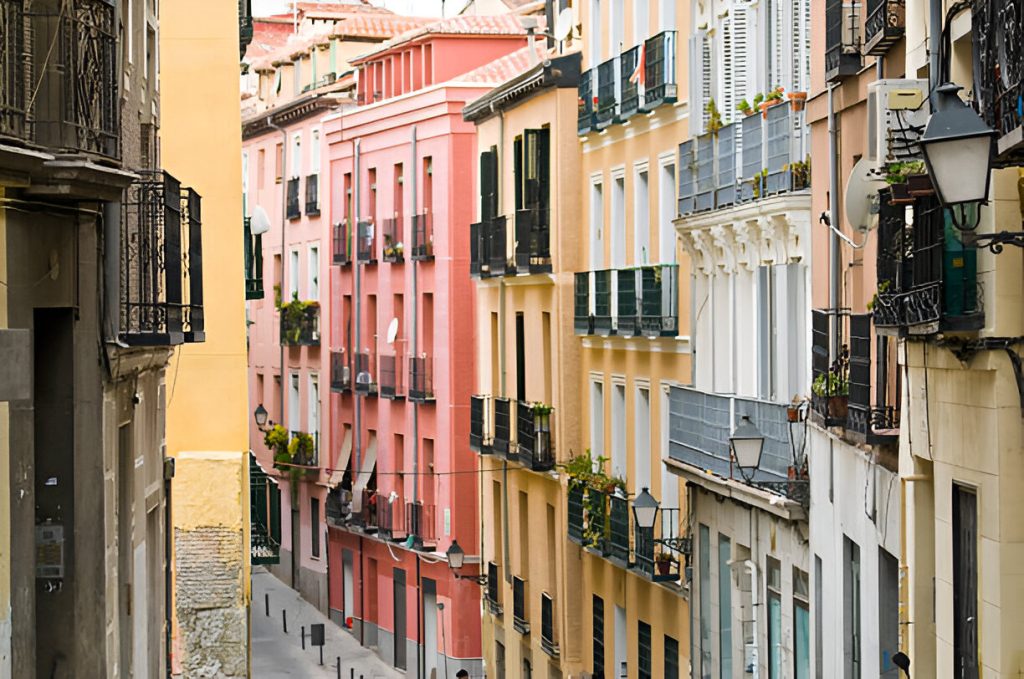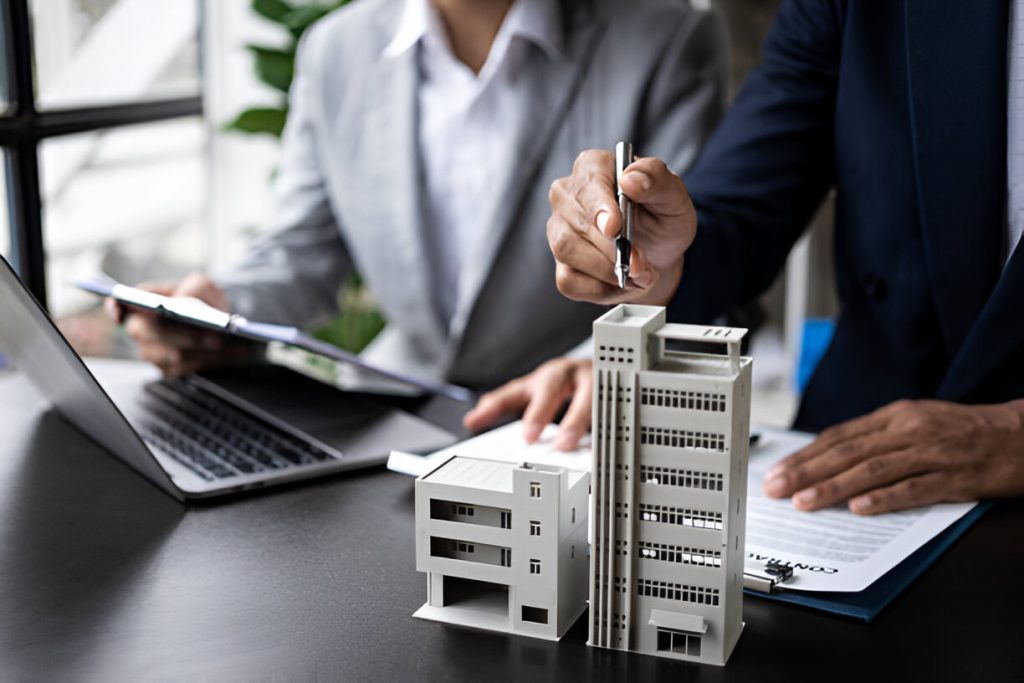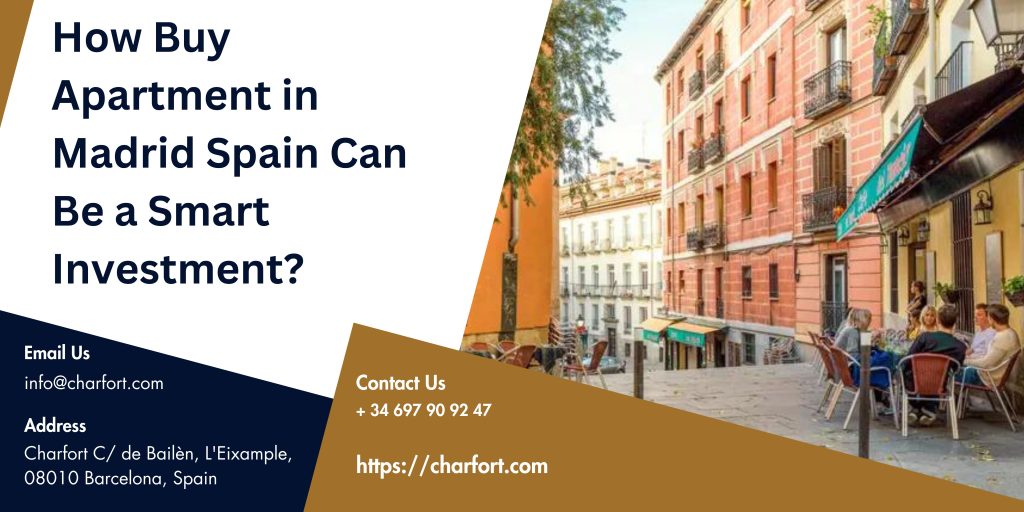
If you’re looking to Buy Apartment in Madrid Spain, you’re stepping into a world of vibrant culture, historic charm, and promising investment opportunities. Whether you’re considering relocating or simply investing in property, purchasing real estate in Spain’s capital offers numerous benefits. Let’s delve into what makes buying real estate in Madrid a compelling choice.
Key Factors to Consider When Buy Apartment in Madrid Spain
When you’re thinking about buying property in Spain, there are several important factors to keep in mind. This guide will help you through the essential steps to make sure your investment goes smoothly.
Choosing the Right Location
First things first, location is everything. Think about what suits your lifestyle best. Are you drawn to the vibrant city life of Barcelona, or do you prefer the tranquil beaches of Costa del Sol? Each region has its own charm and offers different amenities. For instance, if you’re a fan of cultural activities and nightlife, Madrid might be your ideal spot. On the other hand, if you’re after a peaceful retreat with stunning sea views, the Balearic Islands or Canary Islands could be perfect. It’s essential to visit potential areas to get a feel for them before making any decisions.
Understanding the Legal Requirements
The legal side of buying property in Spain can be a bit tricky. Make sure you’re familiar with local laws and regulations. It’s crucial to have a good lawyer who can guide you through the legalities. They’ll help you understand things like property taxes, registration fees, and any other legal obligations. This way, you won’t face any unpleasant surprises down the road.
Checking the Property’s Condition
Before you fall in love with a property, take a close look at its condition. Don’t just focus on the aesthetics; check the structure and systems. This includes the roof, plumbing, electrical systems, and overall maintenance. It might be wise to hire a professional inspector who can spot issues that you might miss. Imagine buying a house and then discovering it needs major repairs—that’s something you want to avoid.
How Much Costs Involved?
It’s not just about the price tag on the property. There are additional costs to consider, such as notary fees, registration fees, and potentially a real estate agent’s commission. You should also budget for any renovations or repairs you might want to undertake. Having a clear picture of all the costs involved will help you manage your budget more effectively and avoid any financial surprises.
Getting to Know the Community
Finally, getting to know the local community can make a big difference. Talk to future neighbors and get a sense of what life is like in the area. This can give you insights into everything from local services to the overall vibe of the neighborhood. If possible, spend some time living in the area before you commit to buying. It’s one thing to visit on vacation and another to live there full-time.
By considering these factors, you’ll be better prepared to make an informed decision about buying real estate in Spain. Take your time, do your homework, and seek expert advice when needed. With the right approach, you can find a property that suits your needs and fits perfectly into your lifestyle.
What to Look for in a Madrid Apartment?
Finding the perfect apartment in Madrid can be an exciting but challenging task. With its vibrant neighborhoods and rich history, Madrid offers a diverse range of options. Here’s what you should keep in mind to ensure you find an apartment that fits your needs and lifestyle.

Location and Neighborhood Vibes
Madrid is made up of distinct neighborhoods, each with its own character. When choosing an apartment, think about what kind of environment you prefer. Areas like Malasaña and Chueca are known for their lively, youthful atmosphere and nightlife, while neighborhoods such as Chamberà and Salamanca offer a more upscale and traditional vibe. Consider proximity to work, public transportation, and amenities like grocery stores, parks, and restaurants. Spend some time walking around the neighborhoods you’re interested in to get a true feel for the area.
Size and Layout
The size of the apartment is crucial, but so is the layout. Think about how much space you need and how you’ll use it. An open-plan living area might be ideal for entertaining, while a separate kitchen could suit those who enjoy cooking. Pay attention to the number of bedrooms and bathrooms to ensure they match your needs. Don’t forget to consider storage space—closets, cabinets, and possibly a garage or storage unit can make a big difference in your daily life.
Condition of the Property
Take a close look at the apartment’s condition. Check the walls, floors, and ceilings for any signs of damage. Make sure the windows and doors are in good shape and that the heating and cooling systems work properly. If you’re considering an older apartment, it might be worth having a professional inspection to identify any potential issues with plumbing or electrical systems. A well-maintained property can save you from unexpected repairs and additional costs later on.
Natural Light and Ventilation
Madrid enjoys plenty of sunshine, so look for an apartment that takes advantage of this. Natural light can make a space feel more open and welcoming. Check for large windows and consider the apartment’s orientation to make sure you get ample sunlight throughout the day. Proper ventilation is also important for comfort, especially in summer. Make sure there are good airflow options to keep the apartment fresh and airy.
Building Amenities and Management
If you’re considering a property in a larger building or complex, think about the amenities offered. Some buildings come with added perks like a gym, pool, or communal garden. It’s also important to understand how the building is managed. Check if there is a building manager or homeowners’ association and inquire about any additional fees. A well-managed building can ensure a smoother living experience and prompt maintenance when needed.
Safety and Security
Safety should be a top priority. Look at the security features of the apartment, such as secure locks on doors and windows. Check if the building has a doorman or surveillance cameras. Additionally, research the safety of the neighborhood by looking into local crime rates and talking to current residents. A safe and secure environment will contribute greatly to your peace of mind.
Financial Aspects of Buy Apartment in Madrid Spain
If you’re considering buying property in Madrid, it’s essential to get a handle on the financial side of things. Madrid is a vibrant city with a diverse real estate market, and getting a good grasp of the costs involved can make the buying process smoother. Here’s what you need to know.
Property Prices in Madrid
Madrid’s property market is dynamic and can vary significantly depending on the neighborhood. For instance, central areas like Salamanca or Chamberà can have steep prices compared to more suburban areas. Understanding these differences will help you budget appropriately. For example, a small apartment in a trendy central area might cost more per square meter than a larger apartment on the outskirts.
Additional Costs Beyond the Purchase Price
When buying property in Madrid, the purchase price is just the start. There are additional costs to consider, including:
- Taxes: One of the major expenses is the Property Transfer Tax (ITP), which ranges from 6% to 10% of the property price, depending on the region and the purchase price. New properties usually have VAT (IVA) at 10% instead of ITP.
- Notary Fees: A notary will need to formalize the sale, and their fees can range from a few hundred to over a thousand euros, depending on the complexity of the transaction.
- Registration Fees: After the purchase, the property needs to be registered in your name at the Land Registry. This typically costs a few hundred euros.
- Legal Fees: Hiring a lawyer to handle the transaction and ensure all legal aspects are covered is advisable. Legal fees generally amount to 1% to 2% of the purchase price.
Mortgage Costs
If you’re planning to finance the property with a mortgage, there are additional costs to factor in:
- Mortgage Arrangement Fees: Banks often charge an arrangement fee, which can be up to 1% of the loan amount.
- Interest Rates: Spanish mortgages can come with fixed or variable interest rates. It’s important to compare rates and understand how they will affect your monthly payments.
- Insurance: Banks usually require home insurance, and you might also need life insurance as a condition of the mortgage.
Ongoing Costs
Owning property in Madrid also involves ongoing costs that you should budget for:
- Community Fees: If the property is in a building with shared facilities, there will be community fees for the maintenance of common areas.
- Property Taxes: The annual property tax (IBI) is based on the cadastral value of the property and varies depending on the property’s location and size.
- Utilities and Maintenance: Regular utilities like water, electricity, and gas will be part of your ongoing expenses. Additionally, setting aside a budget for maintenance and unexpected repairs is a good idea.
Tips for Managing Costs
Buying property in Madrid can be a significant investment, so managing costs effectively is key. Here are some tips:
- Get Professional Advice: Consult with real estate agents, lawyers, and financial advisors who are familiar with the Madrid property market to avoid surprises.
- Budget for Contingencies: Always have a contingency fund to cover unexpected costs that might arise during the purchasing process or in the future.
- Compare Financing Options: Shop around for the best mortgage rates and terms to ensure you get the most favorable deal.
By understanding these financial aspects, you’ll be better prepared to make informed decisions and enjoy your new property in Madrid without any unwelcome surprises.
Legal Considerations When Purchasing Property in Madrid
Purchasing property in Madrid is a significant decision and comes with its own set of legal requirements and considerations. If you’re thinking about buying a property in Spain’s vibrant capital, it’s crucial to be aware of the legal landscape to ensure a smooth transaction. Here’s a straightforward guide to what you need to know.
Checking Property Ownership
First things first, you need to verify who legally owns the property you’re interested in. This step is crucial to make sure that the seller has the right to transfer ownership. You can do this by obtaining a certificate from the Land Registry, which will provide details about the property’s ownership and any potential legal encumbrances.
Confirming Property Documentation
Before you proceed, ensure that all property documents are in order. This includes the title deed, which should be free from any legal issues or debts. Check if the property has all necessary permits, such as planning permissions and habitation certificates. Without these documents, you might face problems later on.
Understanding Local Taxes
Buying property in Madrid involves paying several taxes. The main ones include the Property Transfer Tax, which is based on the property’s purchase price, and the Notary Fees for the legal formalization of the sale. Additionally, you’ll need to pay for the registration of the property in the Land Registry. Understanding these costs will help you budget properly and avoid any surprises.
Reviewing the Purchase Agreement
The purchase agreement is a critical document in the buying process. It outlines the terms and conditions of the sale. Make sure you read this agreement carefully and understand all its clauses. It should include details about the payment schedule, the completion date, and what happens if either party fails to meet their obligations. If necessary, have a lawyer review the agreement to ensure everything is in order.
Notary and Registration Process
In Spain, property transactions must be formalized in the presence of a notary. This official will oversee the signing of the title deed and ensure that the transaction is legal. After the notary’s involvement, the next step is to register the property in the Land Registry. This final step legally confirms you as the new owner. Both steps are essential to secure your ownership and protect your investment.
How to Find the Right Real Estate Agent in Madrid?
Finding the right real estate agent can make a huge difference when buying or selling property in Madrid. With so many agents available, it’s important to choose one who understands your needs and can guide you through the process smoothly. Here’s a straightforward guide to help you find the perfect real estate agent for your needs.

Determine Your Needs
Start by figuring out exactly what you’re looking for in a real estate agent. Are you buying or selling? Do you need someone who specializes in a particular type of property or area in Madrid? Knowing your needs will help you find an agent with the right expertise. For instance, if you’re looking for a family home in a specific neighborhood, you’ll want an agent who knows that area well.
Research and Gather Recommendations
Begin your search by looking online for real estate agents in Madrid. Check out reviews and ratings to get an idea of their reputation. Ask friends, family, or colleagues if they can recommend someone based on their experiences. Personal recommendations can be invaluable and give you confidence in your choice.
Check Their Experience and Specialization
When you have a list of potential agents, dig into their backgrounds. How long have they been in the business? Do they specialize in the type of property you’re interested in? An experienced agent with a track record of handling transactions similar to yours is often a good choice. Their familiarity with the local market can be a significant advantage.
Interview Potential Agents
Don’t be afraid to meet with a few agents before making your decision. During these meetings, ask about their approach to buying or selling property, their understanding of the Madrid market, and how they plan to meet your needs. This is also a good time to gauge their communication style and how comfortable you feel working with them.
Evaluate Their Communication Skills
Effective communication is key in real estate transactions. Choose an agent who listens to your concerns, answers your questions clearly, and keeps you informed throughout the process. A good agent should be responsive and proactive in addressing any issues that arise.
Review Their Track Record
Ask potential agents for references or examples of recent transactions. This will give you a sense of their success rate and how well they’ve handled deals similar to yours. A strong track record of closing sales and satisfied clients can be a good indicator of their capabilities.
Discuss Fees and Contracts
Make sure you understand how the agent’s fees are structured and what services are included. Some agents charge a flat fee, while others work on commission. Review the terms of any agreements or contracts carefully before signing. It’s important to know what you’re committing to and what you can expect in return.
FAQs
What is the average cost of an apartment in Madrid?
The cost varies widely depending on the location and size of the apartment. On average, prices can range from €2,000 to €4,000 per square meter.
Do I need a Spanish bank account to buy property in Madrid?
Yes, it is recommended to have a Spanish bank account for managing transactions and paying property-related expenses.
Can foreigners buy property in Madrid?
Yes, foreigners can purchase property in Madrid. It is advisable to work with a local lawyer to navigate the legal requirements.
Conclusion
Buying an apartment in Madrid, Spain, can be a rewarding investment, offering both financial and lifestyle benefits. By understanding the local market, evaluating property features, and considering the financial and legal aspects, you can make a well-informed decision. Whether you’re looking to relocate or invest, Madrid’s real estate market has something to offer for everyone.

